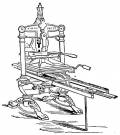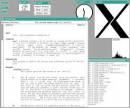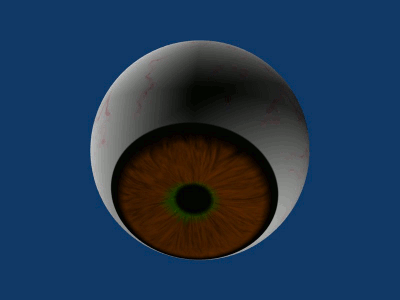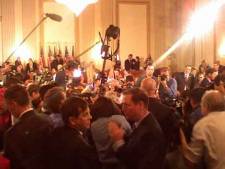 If you were to count up all of the earnest articles, blog entries, and even Colbert Report routines that have been dedicated to the Amazon vs. Hatchette dispute, well, you wouldn't have an accurate number, because more would have been written while you were counting. Curiously enough, almost 100% of them miss the point of greatest concern to authors. The real issue isn't whether the on-line retailer or the publishers win the current battle, but whether there will be any real competition in the marketplace in the future regardless of who wins. Right now, it's very hard for me to see how there can be. Here's why.
If you were to count up all of the earnest articles, blog entries, and even Colbert Report routines that have been dedicated to the Amazon vs. Hatchette dispute, well, you wouldn't have an accurate number, because more would have been written while you were counting. Curiously enough, almost 100% of them miss the point of greatest concern to authors. The real issue isn't whether the on-line retailer or the publishers win the current battle, but whether there will be any real competition in the marketplace in the future regardless of who wins. Right now, it's very hard for me to see how there can be. Here's why.
New to The Alexandria Project? Find a plot synopsis and guide to the characters here, find the earlier chapters here, and follow the Further Adventures of Frank on Twitter
 General Chan Bok-choy, ranking general of the Peoples Army of North Korea, was walking across a broad plaza at the side of the President of the Supreme People’s Assembly. They had just left a meeting with the Dear Leader, and had only a few minutes to converse without being overheard by their aides, or by those in the listening rooms that monitored the microphones that were everywhere.
General Chan Bok-choy, ranking general of the Peoples Army of North Korea, was walking across a broad plaza at the side of the President of the Supreme People’s Assembly. They had just left a meeting with the Dear Leader, and had only a few minutes to converse without being overheard by their aides, or by those in the listening rooms that monitored the microphones that were everywhere.
General Bok-choy knew that they were not completely safe from surveillance even here. Doubtless, some member of the Secret Police was filming them from a hidden location using a telescopic lens, so that another agent could later try to read their lips. For that reason, the General walked with his hands clasped behind his back and his head bowed. Being at the top of the chain of command in the paranoid, otherworld of North Korea meant you were always being spied on by everyone else in the inner circle. And, of course, you were spying on them as well.
President
Kim Lang-dong spoke first.
“Are you sure that you can destroy both Washington and New York, General?”
“There can be no doubt.”
 Where were you when you first learned about open source software? If you’re under, say, the age of 40, your answer will probably be, “Come again? I’ve always known about it!” But if you’re older, you may recall the first time you ever heard the phrase. Maybe it was when Netscape announced it was going to “open source” its Navigator Browser, or perhaps when you heard the name Richard Stallman for the first time. It may also be the case that it was some time before you really got your arms around what open software (or Stallman’s Free and Open Software) really meant in all of its various connotations – license-wise, commercial and community.
Where were you when you first learned about open source software? If you’re under, say, the age of 40, your answer will probably be, “Come again? I’ve always known about it!” But if you’re older, you may recall the first time you ever heard the phrase. Maybe it was when Netscape announced it was going to “open source” its Navigator Browser, or perhaps when you heard the name Richard Stallman for the first time. It may also be the case that it was some time before you really got your arms around what open software (or Stallman’s Free and Open Software) really meant in all of its various connotations – license-wise, commercial and community.
Or maybe you got involved before the phrase “open source software” had even been coined (in 1998, by Bruce Perens and Eric S. Raymond) to describe what it was they were doing.
New to The Alexandria Project? Find a plot synopsis and guide to the characters here, find the earlier chapters here, and follow the Further Adventures of Frank on Twitter
 “There? That dusty old bookstore? That's where you think the Alexandria Project that's trying to take down western civilization as we know it is based?"
“There? That dusty old bookstore? That's where you think the Alexandria Project that's trying to take down western civilization as we know it is based?"
“Yes, 'that dusty old bookstore!'” Marla snapped. “My father’s certain that’s where the attacks are coming from. We’re in Alexandria, right? So it all ties together. And in case you’ve forgotten, the first gripe the Alexandria Project mentioned in the letter they sent George Marchand was about the Library of Congress pulping books,” so why not a bunch of book fanatics? Marla blew her nose, and Carl noticed for the first time that she had a bad cold.
“Okay, okay. It’s just not what I had expected, but don’t worry, we’ll take it from here.”
“’We’ll take it from here?’ What is that supposed to mean?” Marla was more than annoyed now.
Carl looked surprised. “You know, I’ll report in to headquarters, we’ll comb the store without the owners knowing anything, and if we can find the right evidence, we’ll arrest them.”
“Right.” Marla said. “Exactly right. That’s just what we’ll do. Didn’t anyone teach you how to use pronouns properly?”
 Unless you’ve been taking a holiday from the news for the past month, you are already aware that Amazon is in the midst of a very nasty negotiation with Hatchette, one of the “Big Five” U.S. publishers. Together, as a result of a decades-long series of acquisitions, these five companies have consolidated virtually all of the most-revered, but now conglomerate-owned, publishing houses in the U.S. Given the degree of respect that books still command, the dispute has attracted far more public commentary than commercial disputes in such a narrow market usually attract.
Unless you’ve been taking a holiday from the news for the past month, you are already aware that Amazon is in the midst of a very nasty negotiation with Hatchette, one of the “Big Five” U.S. publishers. Together, as a result of a decades-long series of acquisitions, these five companies have consolidated virtually all of the most-revered, but now conglomerate-owned, publishing houses in the U.S. Given the degree of respect that books still command, the dispute has attracted far more public commentary than commercial disputes in such a narrow market usually attract.
New to The Alexandria Project? Find a plot synopsis and guide to the characters here, find the earlier chapters here, and follow the Further Adventures of Frank on Twitter
 George Marchand was not at his desk at the Library of Congress. Instead, he was ordering a mixed selection of donuts at The Bakers Dozen, a coffee shop in a small town outside the Beltway. Paying for his purchase, he asked the teenager if they had a restroom. “In the back,” she said, counting out his change without looking up.
George Marchand was not at his desk at the Library of Congress. Instead, he was ordering a mixed selection of donuts at The Bakers Dozen, a coffee shop in a small town outside the Beltway. Paying for his purchase, he asked the teenager if they had a restroom. “In the back,” she said, counting out his change without looking up.
George strolled to the rear of the shop and opened the door in the rear wall of the seating area. He ignored the two restroom entrances on the other side, and instead unlocked the unmarked door to their right. Closing it behind him, he found a flight of stairs leading to another door, this time without either a keyhole or a doorknob.
When he arrived at the top, George slid his fingers along the door trim on the right until he found a recessed area. Pushing against it, he felt the trim unlatch, and he swung it open on its hidden hinges to expose a numerical keypad. After punching in a seven number sequence, the door swung open to reveal a modest sized room containing nothing but a conference room with chairs, and a series of doors set into its walls. Sitting around the table were three men about his own age.
“How come I always have to buy the donuts?” George asked as he walked in, pushing the door closed behind him.
New to The Alexandria Project? Find a plot synopsis and guide to the characters here, find the earlier chapters here, and follow the Further Adventures of Frank on Twitter
 The President of the United States was treating himself to an early breakfast of bacon and eggs. Why not? If a Commander in Chief couldn’t ignore his doctor’s orders on his 70th birthday, why bother to have the job at all?
The President of the United States was treating himself to an early breakfast of bacon and eggs. Why not? If a Commander in Chief couldn’t ignore his doctor’s orders on his 70th birthday, why bother to have the job at all?
“Ready, Mr. President?”
“Go for it, Harry.”
Adlai Stevenson Harrison was the President’s Director of National Intelligence. He was also one of his oldest and best friends, and therefore one of the few advisors the President invited to join him in the family’s private quarters on the upper floor of the White House.
Harrison took the Daily Brief he had completed a half hour before from his briefcase and handed it across the breakfast table as the President put on his reading glasses.
“Hmm. I see you’ve moved Korea to the top position. What’s new since yesterday? Have they gone and sunk another South Korean boat?”
New to The Alexandria Project? Find a plot synopsis and guide to the characters here, find the earlier chapters here, and follow the Further Adventures of Frank on Twitter
 iBall.com CEO Chad Derwent sat alone in his office in Silicon Valley. Outside his open door, rows of empty, silent cubicles stretched from one end of the office floor to the other.
iBall.com CEO Chad Derwent sat alone in his office in Silicon Valley. Outside his open door, rows of empty, silent cubicles stretched from one end of the office floor to the other.
For the last several minutes he had been staring down at the stack of papers on his desk, unable to deal with the reality of the title of the one on top: “Petition for Liquidation in Bankruptcy.” He couldn’t bear to look up at the picture on the wall where, he knew, Vinod and he were posed with their first half-dozen employees. Everyone was smiling, because iBall.com had just gone live on the Web. Back then, he’d never supposed it would end like this.
But it had, and there was nothing to be done about it. Nothing to be done but pick up his pen and begin to sign the papers in the stack, one by one.
The phone rang. Chad looked at it in surprise. Ever since it became clear that iBall.com could not survive, the stench of failure had descended upon him, and even his email had dwindled to a trickle. Was it his mother?
New to The Alexandria Project? Find a plot synopsis and guide to the characters here, find the earlier chapters here, and follow the Further Adventures of Frank on Twitter
 Library of Congress CIO George Marchand sat uneasily in the witness chair of the hearing room. On a raised platform in front of him stretched a semicircular table, dotted with microphones. Behind those microphones sat all but one of the members of the Inquisition also known as the Congressional Subcommittee on Cybersecurity.
Library of Congress CIO George Marchand sat uneasily in the witness chair of the hearing room. On a raised platform in front of him stretched a semicircular table, dotted with microphones. Behind those microphones sat all but one of the members of the Inquisition also known as the Congressional Subcommittee on Cybersecurity.
Crouching like a pack of hyenas on the floor between the subcommittee and witness tables were dozens of photographers, polishing their lenses in anticipation of the kill. To George’s right, bored looking C-SPAN video engineers peered at him from beside their cameras, like vultures waiting for a dying wildebeest to get on with it, already.
George glanced at his watch with a sigh. It was almost 10:00, and therefore time for today’s orgy of Congressional ego gratification and wrathful citizenry appeasement to begin. George hoped his introductory role in the hearing would be brief.
New to The Alexandria Project? Find a plot synopsis and guide to the characters here, find the earlier chapters here, and follow the Further Adventures of Frank on Twitter
 Just as Bart Thatcher promised, Frank saw nothing but forever when he looked to the west – simply wave after wave of mountains and valleys extending effortlessly into the haze of the horizon. From high above, where the branches of ponderosa pines laced together, the squawks of scrub jays filtered down, along with the dappling light of the afternoon sun. And next to him rested a laptop connected to the outside world via the formidable telecommunications resources of Frank’s improbable, but undeniably useful, Solar Avenger.
Just as Bart Thatcher promised, Frank saw nothing but forever when he looked to the west – simply wave after wave of mountains and valleys extending effortlessly into the haze of the horizon. From high above, where the branches of ponderosa pines laced together, the squawks of scrub jays filtered down, along with the dappling light of the afternoon sun. And next to him rested a laptop connected to the outside world via the formidable telecommunications resources of Frank’s improbable, but undeniably useful, Solar Avenger.
Frank was already oblivious to the stunning view ahead of him, now that he was focusing non-stop on cracking the secrets of the Alexandria Project. His goals in that pursuit were clear: figure out how those behind the Project penetrated their targets; devise technical defenses capable of stopping them; and figure out who they were and where they were striking from. Unfortunately, it wasn’t going well.
 If you were to count up all of the earnest articles, blog entries, and even Colbert Report routines that have been dedicated to the Amazon vs. Hatchette dispute, well, you wouldn't have an accurate number, because more would have been written while you were counting. Curiously enough, almost 100% of them miss the point of greatest concern to authors. The real issue isn't whether the on-line retailer or the publishers win the current battle, but whether there will be any real competition in the marketplace in the future regardless of who wins. Right now, it's very hard for me to see how there can be. Here's why.
If you were to count up all of the earnest articles, blog entries, and even Colbert Report routines that have been dedicated to the Amazon vs. Hatchette dispute, well, you wouldn't have an accurate number, because more would have been written while you were counting. Curiously enough, almost 100% of them miss the point of greatest concern to authors. The real issue isn't whether the on-line retailer or the publishers win the current battle, but whether there will be any real competition in the marketplace in the future regardless of who wins. Right now, it's very hard for me to see how there can be. Here's why. General Chan Bok-choy, ranking general of the Peoples Army of North Korea, was walking across a broad plaza at the side of the President of the Supreme People’s Assembly. They had just left a meeting with the Dear Leader, and had only a few minutes to converse without being overheard by their aides, or by those in the listening rooms that monitored the microphones that were everywhere.
General Chan Bok-choy, ranking general of the Peoples Army of North Korea, was walking across a broad plaza at the side of the President of the Supreme People’s Assembly. They had just left a meeting with the Dear Leader, and had only a few minutes to converse without being overheard by their aides, or by those in the listening rooms that monitored the microphones that were everywhere.  Where were you when you first learned about open source software? If you’re under, say, the age of 40, your answer will probably be, “Come again? I’ve always known about it!” But if you’re older, you may recall the first time you ever heard the phrase. Maybe it was when Netscape announced it was going to “open source” its Navigator Browser, or perhaps when you heard the name Richard Stallman for the first time. It may also be the case that it was some time before you really got your arms around what open software (or Stallman’s Free and Open Software) really meant in all of its various connotations – license-wise, commercial and community.
Where were you when you first learned about open source software? If you’re under, say, the age of 40, your answer will probably be, “Come again? I’ve always known about it!” But if you’re older, you may recall the first time you ever heard the phrase. Maybe it was when Netscape announced it was going to “open source” its Navigator Browser, or perhaps when you heard the name Richard Stallman for the first time. It may also be the case that it was some time before you really got your arms around what open software (or Stallman’s Free and Open Software) really meant in all of its various connotations – license-wise, commercial and community. “There?
“There?  Unless you’ve been taking a holiday from the news for the past month, you are already aware that Amazon is in the midst of a very nasty negotiation with Hatchette, one of the “Big Five” U.S. publishers. Together, as a result of a decades-long series of acquisitions, these five companies have consolidated virtually all of the most-revered, but now conglomerate-owned, publishing houses in the U.S. Given the degree of respect that books still command, the dispute has attracted far more public commentary than commercial disputes in such a narrow market usually attract.
Unless you’ve been taking a holiday from the news for the past month, you are already aware that Amazon is in the midst of a very nasty negotiation with Hatchette, one of the “Big Five” U.S. publishers. Together, as a result of a decades-long series of acquisitions, these five companies have consolidated virtually all of the most-revered, but now conglomerate-owned, publishing houses in the U.S. Given the degree of respect that books still command, the dispute has attracted far more public commentary than commercial disputes in such a narrow market usually attract. George Marchand was not at his desk at the Library of Congress. Instead, he was ordering a mixed selection of donuts at The Bakers Dozen, a coffee shop in a small town outside the Beltway. Paying for his purchase, he asked the teenager if they had a restroom. “In the back,” she said, counting out his change without looking up.
George Marchand was not at his desk at the Library of Congress. Instead, he was ordering a mixed selection of donuts at The Bakers Dozen, a coffee shop in a small town outside the Beltway. Paying for his purchase, he asked the teenager if they had a restroom. “In the back,” she said, counting out his change without looking up. The President of the United States was treating himself to an early breakfast of bacon and eggs. Why not? If a Commander in Chief couldn’t ignore his doctor’s orders on his 70th birthday, why bother to have the job at all?
The President of the United States was treating himself to an early breakfast of bacon and eggs. Why not? If a Commander in Chief couldn’t ignore his doctor’s orders on his 70th birthday, why bother to have the job at all?  iBall.com CEO Chad Derwent sat alone in his office in Silicon Valley. Outside his open door, rows of empty, silent cubicles stretched from one end of the office floor to the other.
iBall.com CEO Chad Derwent sat alone in his office in Silicon Valley. Outside his open door, rows of empty, silent cubicles stretched from one end of the office floor to the other.  Library of Congress CIO George Marchand sat uneasily in the witness chair of the hearing room. On a raised platform in front of him stretched a semicircular table, dotted with microphones. Behind those microphones sat all but one of the members of the Inquisition also known as the Congressional Subcommittee on Cybersecurity.
Library of Congress CIO George Marchand sat uneasily in the witness chair of the hearing room. On a raised platform in front of him stretched a semicircular table, dotted with microphones. Behind those microphones sat all but one of the members of the Inquisition also known as the Congressional Subcommittee on Cybersecurity.  Just as Bart Thatcher promised, Frank saw nothing but forever when he looked to the west – simply wave after wave of mountains and valleys extending effortlessly into the haze of the horizon. From high above, where the branches of ponderosa pines laced together, the squawks of scrub jays filtered down, along with the dappling light of the afternoon sun. And next to him rested a laptop connected to the outside world via the formidable telecommunications resources of Frank’s improbable, but undeniably useful, Solar Avenger.
Just as Bart Thatcher promised, Frank saw nothing but forever when he looked to the west – simply wave after wave of mountains and valleys extending effortlessly into the haze of the horizon. From high above, where the branches of ponderosa pines laced together, the squawks of scrub jays filtered down, along with the dappling light of the afternoon sun. And next to him rested a laptop connected to the outside world via the formidable telecommunications resources of Frank’s improbable, but undeniably useful, Solar Avenger.